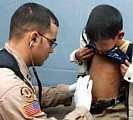In Iraq, getting to the good stuff isn't always easy
 BAGHDAD, Iraq — "Whose idea was this?" a soldier's voice cracked over the headsets Tuesday morning, as three heavily armed U.S. Army Humvees snaked through the anarchic streets of Baghdad.
BAGHDAD, Iraq — "Whose idea was this?" a soldier's voice cracked over the headsets Tuesday morning, as three heavily armed U.S. Army Humvees snaked through the anarchic streets of Baghdad.The rhetorical question generated muted laughter in a decidedly unfunny situation.
Stop-and-go traffic had the convoy's nine soldiers on edge. The overloaded push carts and bumper-to-bumper cars were a little too close for comfort. The turret gunners growled obscenities at the kid hurling rocks at them. And all disliked the thought that somewhere out there was "Dimitri," the nom de guerre given to a particularly sharp sniper who has killed an undisclosed number of U.S. and coalition forces.
About 50 U.S. soldiers and supporting Iraqi troops on Tuesday were eager to show a free, one-day medical clinic at Al Ahrar Elementary School, the third such operation in this predominantly Sunni area.
The week before, a gunman wounded a soldier in the thigh and effectively disrupted the clinic, despite a previous joint U.S.-Iraqi military sweep of the neighborhood. Forces found a suspect; the wounded soldier is recovering.
The initiative that began in August is "intended to provide quick response, on-site care for citizens in areas that had recently been cleared," said Maj. James Lowe. The sweeps for weapons and insurgents disrupts lives of citizens, "so this program is intended to help that," he added.
It's not as if there isn't any good news going on in Iraq, a country synonymous with car bombings, sectarian violence and chronic fuel shortages.
But as Tuesday's 40-minute foray from the fortified Green Zone to Adhamiyah in northeast Baghdad demonstrated, just getting to the good news remains a challenge.
U.S. and Iraqi forces have established one-day clinics in at least four other parts of Baghdad. Providing for basic human needs is essential to counter rival Shiite and Sunni Muslim insurgencies, U.S. and Iraqi officials note. The goal is to help Iraqis secure neighborhoods so the Iraqi government — itself a fragile alliance of religious and regional rivals — can build and operate permanent clinics.
"We're not going to let thugs dictate where we can go," said Lowe, who quickly added that clinic visitors would be safe as long as they stayed inside the walls of the school's white courtyard.
Read the rest at the Seattle Times
Related Link:
U.S. and Iraqi troops complete house-to-house sweeps of troubled Baghdad neighborhood

<< Home